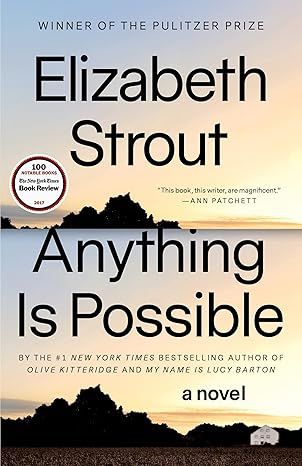Anything Is Possible: A Novel
4 out of 5
19,323 global ratings
NEW YORK TIMES BESTSELLER • An unforgettable cast of small-town characters copes with love and loss in this “compulsively readable” (San Francisco Chronicle) novel from the Pulitzer Prize–winning author of Olive Kitteridge and My Name is Lucy Barton
“This book, this writer, are magnificent.”—Ann Patchett
WINNER OF THE STORY PRIZE • A BEST BOOK OF THE YEAR: The New York Times, The Washington Post, USA Today, People, NPR, Entertainment Weekly, Newsday, The Seattle Times, Esquire, The Guardian, Kirkus Reviews, Publishers Weekly
In Anything Is Possible, Elizabeth Strout explores the whole range of human emotion through the intimate dramas of people struggling to understand themselves and others. Here are two sisters: One trades self-respect for a wealthy husband while the other finds in the pages of a book a kindred spirit who changes her life. A grown daughter longs for mother love even as she comes to accept her mother’s happiness in a foreign country. And Lucy Barton returns to visit her siblings after seventeen years of absence. Reverberating with the deep bonds of family, and the hope that comes with reconciliation, Anything Is Possible “confirms Strout as one of our most grace-filled, and graceful, writers” (The Boston Globe).
304 pages,
Kindle
Audiobook
Hardcover
Paperback
Audio CD
First published March 26, 2018
ISBN 9780812989410
About the authors
Elizabeth Strout
Elizabeth Strout is the author of the New York Times bestseller Olive Kitteridge, for which she was awarded the Pulitzer Prize; the national bestseller Abide with Me; and Amy and Isabelle, winner of the Los Angeles Times Art Seidenbaum Award and the Chicago Tribune Heartland Prize. She has also been a finalist for the PEN/Faulkner Award and the Orange Prize in London. She lives in Maine and New York City.
Read more
Reviews
Victoria M. Ward
5
Quietly wonderful.
Reviewed in the United States on July 13, 2024
Verified Purchase
Stories about some of the characters in "My Name is Lucy Barton". About sadness and desperation and the redemptive power of kindness.
Ceclila
5
OUR BEST OBSERVER OF HUMAN BEHAVIOR WRITING CONTEMPORARY FICTION TODAY
Reviewed in the United States on June 4, 2017
Verified Purchase
EXCERPT Interrelated stories by the most acute observer of human behavior writing fiction today.
BOOK REVIEW: ELIZABETH STROUT’S LUMINOUSSHORT-STORY COLLECTION, ‘ANYTHING IS POSSIBLE’
BY CECILIA M. FORD, PH.D.
Elizabeth Strout’s astonishing new collection of short stories, Anything Is Possible, reconfirms her status as the most acute observer of human behavior writing fiction today. While each story about the local people who live in or around Amgash, Illinois, is a stand-alone gem, they are interrelated, much the way people in any community are in reality. We live our parallel lives, sometimes interacting, sometimes not at all, and then meeting up again later. Some characters central to later stories are introduced in an earlier one through town gossip and idle observations or recollections that people make to each other—as we all do, all the time.
Amgash is the hometown of the central character of Strout’s last novel, My Name Is Lucy Barton, and she and her family also make appearances in this book. Lucy herself is a relative of Olive Kittredge, the main character of Strout’s eponymous book of linked stories, which won the Pulitzer Prize for fiction in 2009. It was also made into an acclaimed HBO series starring Frances McDormand.
Like those two previous books, Anything Is Possible has the stunning clarity and simplicity of Shaker furniture or a Thomas Eakins portrait, crafted with honesty and a sure hand. Strout has the uncanny ability to describe a character in a few simple sentences. The people in her stories come to life both as unique individuals as well as men and women you will recognize from your own experience.
Talking of a bitter woman whose life has turned out differently than she thought it would, a neighbor explains, “people need to feel superior to someone.” About another, Strout writes, “Life had simply not been what she thought it would be. Shelly had taken life’s disappointments and turned them into a house.”
Lucy Barton is one of the only people to have fled this small but not especially intimate community. These are people who harbor secrets, memories that shame them or thoughts they don’t think others will understand.
With many of Strout’s characters, what’s unsaid is often as important as what is said. Lucy’s cousin, a kind man named Abel Blaine, is one of the few other characters that left Amgash and did well, leaving their childhood of bitter poverty behind and starting a successful business. Now a grandfather, he reflects silently on his long marriage:
“After many years of marriage things get said, scenes occur, and there is a cumulative effect as well. All this sped through Abel’s heart, that the tenderness between husband and wife had long been attenuating and that he might have to live the rest of his life without it.”
Though Abel and Lucy have escaped small-town life and their deprived childhoods, he is aware of “how much one forgot but then lived with anyway—like phantom limbs.” Strout is a writer who intuitively understands the complex nature of how the past stays with us and how its scars are constantly reasserting themselves. Another character, a woman named Annie, reflects that “her own experience over the years now spread like a piece of knitting in her lap with different colored yarns—some dark—all through it.”
These dark threads provide an undercurrent of vulnerability to Strout’s characters. Their tenuous hold on what they have overcome—some, like Lucy’s brother Pete, not all that well—is a constant shadow that hovers nearby.
But the residents of Amgash are plain people despite the secrets of the dark past. Abel’s sister, Dottie, who with him endured desperate poverty as a child, now runs a bed-and-breakfast. She is divorced, often lonely, but “Dottie was not a woman to complain, having been taught by her decent Aunt Edna one summer—it seemed like a hundred years ago, and practically was—that a complaining woman was like pushing dirt beneath the fingernails of God, and this was an image that Dottie had never been able to fully dislodge.”
Elizabeth Strout is a Maine native, and all her previous books have been set either there or in New York, where she spends half her time. Amgash residents are much like the Maine people Strout writes about, though: small-town people living lives limited by geography, obligation, and habit. Yet, as the title of this collection suggests, they are frequently surprised by the turns their paths take and the things they learn about themselves as a result.
Often the characters are revealed through interior monologues as they reflect on these surprising turns. A particularly moving story examines the regret an old woman feels about the pain she has caused her favorite daughter (now middle-aged herself) by moving to Italy and marrying a younger man, after she endured a harsh marriage much longer than she wanted to. Strout writes, “And she could not tell her daughter that had she known what she was doing to her, to her dearest little Angel, she might not have done it. But this was life! And it was messy!”
Family secrets, with their attendant messes, abound. Pete Barton appears in a story in which he prepares for a rare visit from Lucy. In another, a neighbor, Tommy, drops by. He is an older man who had been the school custodian who had kindly let Lucy stay late at school so she could do her homework in the heated building—the Bartons had been so poor that they lived in an unheated garage. Tommy has long wondered about Pete and Lucy’s odd father, damaged by the War (World War II), assuming that he was responsible for the pain he sees in Pete. On this particular visit he has an insight as he watches Pete destroy a sign with a sledgehammer that Mrs. Barton had put up to advertise her small business as a seamstress. Tommy thinks, “Oh, it was the mother. She must have been the really dangerous one.”
Except for Lucy, who has become a well-known writer who lives in New York, the residents of Amgash live outwardly quiet lives but are filled with inner turmoil and conflict. Their stories are about the way average people attempt to cope with their bewilderment. About Tommy, Strout observes, “It seemed the older he grew—and he had grown old—the more he understood that he could not understand this confusing contest between good and evil, and that maybe people were not meant to understand things here on earth.”
Again and again, the people Strout writes about defy expectations—both theirs and others’. Dark secrets, hidden depth, and unexpected decency are woven throughout these elegant stories. “People surprise you,” one character observes. “Not just their kindness, but also their sudden ability to express things in the right way.” And Strout has the ability to portray the human condition with stunning clarity, expressed in just the right way. You will recognize these people, and yourself, in this book.
Read more
11 people found this helpful
Barbara Hinds
5
Another Winner
Reviewed in the United States on September 11, 2024
Verified Purchase
I have enjoyed each one of Elizabeth Strout’s book. This is no exception, even though I am generally not a fan of short stories. But because the characters reappear in different stories and their are relationships between them, I was engrossed in this book and the lives of the people, many I already knew from different books. If the reader is looking for thought-provoking dialogue and the magnitude of wonder found in an ordinary life, this is a fine book.
Read more
Abby
5
Strout is a genius
Reviewed in the United States on May 11, 2017
Verified Purchase
Review: ANYTHING IS POSSIBLE by Elizabeth Strout
I drove two hours to get there, splurging on a hotel in Boston for the chance to hear Her speak. My husband jokes I’m a stalker, but you can’t be arrested for reading every sentence someone published twice, right? It’s been said that Elizabeth Strout's genius lies in her “economy with words” and that is it exactly. Society's been drugging its women for years, she throws out casually in ANYTHING IS POSSIBLE, as if it isn’t a challenging sentence to construct.
This book dives into the later-lives of townspeople who made appearances in MY NAME IS LUCY BARTON. As a reader, this was thrilling because I so wanted more of Lucy and never imagined I would get it. At one point the narrative observes: Lucy Barton had her own shame; oh boy did she have her own shame. And she had risen right straight out of it. This sequel-of-sorts spends the majority of its time with people who did not.
Watching Strout on stage, I was captivated by her compassion. Her characters, always, are flawed. They embarrass themselves. They do terrible, terrible things. They occasionally get caught. And, yet, Strout sits beside them to hear their stories. To understand how they got there. To give them a voice. She isn’t at all concerned with plot, but she is very aware of what a reader needs. Is it time for levity? She’ll give you something like: Dottie didn't often say the word "penis", and she enjoyed it. Does someone need to catch a break? Strout knows it, and tells you so when her character says, “I'm sorry. But when someone's nice to me-- Oh God, it just kills me.” I especially love being there when a conclusion is drawn: I guess there's always a struggle between what to do and what not to do. Or, Everyone, she understood, was mainly and mostly interested in themselves. Or, To listen to a person is not passive.
Run to your local independent bookstore, or wherever it is you buy books, and try not to fall victim to the most common complaint of all, which Strout identifies as, "Life had simply not been what she thought it would be."
*Important reader’s note: Read MY NAME IS LUCY BARTON first. Both books are short; LUCY BARTON + ANYTHING IS POSSIBLE equals the reading time of one novel. Strout gets away with this because of her “economy with words.” It’s a whole story— maybe even a hundred whole stories— it’s just handed over with efficiency.
Read more
18 people found this helpful
Roger Brunyate
5
Lucy Barton's Old Neighbors
Reviewed in the United States on June 12, 2017
Verified Purchase
In the first of the nine stories that comprise this loosely-structured novel, the old former janitor of a school in rural Illinois remembers Lucy Barton, the youngest child of a dirt-poor family who escaped to New York and found success as a writer. She has just come out with a memoir, which one gathers is Strout's miracle novel, MY NAME IS LUCY BARTON. Lucy is mentioned in two or three of the other stories also, and in one, "Sisters," she actually appears, her first return in decades. You do not have to have read the earlier novel to enjoy this one, but it offers a curious payback for those that have. For most of LUCY BRTON, you were waiting for the shoe to drop about what happened to Lucy in her childhood; one of Strout's great strokes of grace came in letting the footwear fall very gently, hinting enough to satisfy but leaving it at that. Here, though, she is much more specific; the almost feral background of Lucy and her family comes across with near-Gothic shock.
Too much so? I might have been disappointed, were it not that the distinctive quality of the earlier book—its grace—is found in abundance here also. Strait returns to the structure of her Pulitzer Prize-winning OLIVE KITTERIDGE, depicting a loose community of interconnected characters through stories, each with its own focus and conclusion, but with the same figures mentioned in others. But the New England orneriness that had soured the earlier collection for me is here replaced by a Midwestern warmth. It is not sappy—many of the characters are edgy and awkward, often elderly too—but there is also a gentleness of understanding that reminds me of Kent Haruf or even Marilynne Robinson.
One example must suffice. Tommy Guptill, the janitor in the opening story, once owned a successful dairy farm, until his inheritance was wiped out by a disastrous fire. But Tommy has a secret that he has not shared even with his wife:
Privately, he thought of the fire as a sign from God to keep this gift tightly to him. Privately, because he did not want to be thought of as a man who made up excuses for a tragedy; and he did not want anyone—not even his dearly beloved wife—to think he would do this. But he had felt that night, while his wife kept the children over by the road—he had rushed them from the house when he saw that the barn was on fire—as he watched the enormous flames flying into the nighttime sky, then heard the terrible screaming sounds of the cows as they died, he had felt many things, but it was just as the roof of his house crashed in, fell into the house itself, right into their bedrooms and the living room below with all the photos of the children and his parents, as he saw this happen he had felt— undeniably—what he could only think was the presence of God, and he understood why angels had always been portrayed as having wings, because there had been a sensation of that—of a rushing sound, or not even a sound, and then it was as though God, who had no face, but was God, pressed up against him and conveyed to him without words—so briefly, so fleetingly— some message that Tommy understood to be: It’s all right, Tommy.
Few episodes in the book share the drama of this one, which takes place well before the novel opens. But the quiet moment with which the story ends, when Tommy finally shares his secret, is utterly typical and, I feel, even more amazing:
And then Tommy understood: that what he had kept from her their whole lives was, in fact, easily acceptable to her, and what he would keep from her now—his doubt (his sudden belief that God had never come to him)—was a new secret replacing the first. He took his hand from hers. “You might be right,” he said. A paltry thing he added, but it was true: He said, “I love you, Shirley.” And then he looked at the ceiling; he could not look at her for a moment or two.
I read the first few stories in growing wonder and deepening joy. Later, Strout expands her rural focus, including a wealthy arts patron, a successful actress, and a company director among her characters, and moving her setting to a small city, northern New England, or the Ligurian coast. I began to fear that the intensity of the opening might become dissipated. But, as with MY NAME IS LUCY BARTON, no matter how far the people travel they never forget the simplicity of their roots. And the last story of all ends with a spiritual return so magical that I can only urge you to savor Strout's book slowly and wait for it.
Read more
31 people found this helpful
Christina Chase
4
remarkable characters
Reviewed in the United States on February 8, 2024
Verified Purchase
Strout understands people. Her characters reflect this. Great book but at times it is difficult to keep the characters straight
E. Sabina Brady
4
Wonderful prose, stronger than prequel, "My Name is Lucy Barton"
Reviewed in the United States on July 10, 2020
Verified Purchase
This novel is an interwoven collection of stories within stories where Strout slowly, quietly and thread by thread, weaves the reader into the seemingly insignificant interconnected lives of the ordinary, very human and often poverty touched residents of a small, mid-west farming community in the US. Her prequel "My Name is Lucy Barton" tangentially introduced us to both the town and its cast of characters (including Lucy's dysfunctional family who are central to "Anything is Possible", as well as their neighbors, school mates and various partners). Interestingly in this sequel, Lucy herself is seldom encountered in person. However, when she is, she plays a grounding and centering role underscoring that 'you can't go home again', but that home always resides within -- for better and (too often) worse. Lucy's (albeit purposefully limited) presence critically allows the reader to empathize and gain affection for the novel's other very flawed characters. Perhaps because the reader is allowed to wander away from Lucy, and the interweaving of other characters' stories is more diverse, nuanced, and the myriad perspectives of life and each other more varied, I found myself enjoying the sequel better than the prequel. Both should be read together however to get the full depth and breadth of this at times painful yet empathetic novel of human frailty, need and compassion. Stout's writing is beautifully crafted as she gradually unfolds her story in a methodical, yet non-linear and accretional way. That said, Marilyn Robinson remains my favorite in her ability to capture and plumb the human spirit within mundane, every day life.
Read more
2 people found this helpful
robin friedman
3
A Visit To Amagash
Reviewed in the United States on May 29, 2018
Verified Purchase
Elizabeth Strout's novel "Anything is Possible" (2017) takes the reader to the fictitious small town of Amagash, Illinois, through nine separate but interrelated stories about some of the town's residents or former residents. The book follows-up Strout's earlier novel "Lucy Barton" in which the title character escapes from a life of poverty in Amagash to become a successful writer in New York City. The characters in "Anything is Possible" are connected to Lucy Barton in different ways, and Barton herself is the primary character in one of the nine stories. I haven't read the earlier book. I think the second book is meant to stand on its own and doesn't presuppose familiarity with "Lucy Barton".
The stories are recounted in the third person but Strout makes an effort to get inside each of her characters from the inside. Most of the protagonists in the story were born desperately poor in rural areas outside the town or holding menial jobs. Some of the individuals have moved on to other things while others remain in poverty. The book shows interactions between the main characters and other residents of Amagash who are economically somewhat better off. The poorer people are often slighted and condescended to by people in better economic circumstances.
Many of the moments in these stories are poignant and effective. Strout delves into the pasts of her characters and to the many disappointments and hardships they have faced in their lives. The stories explore tensions with families and loved ones. Scenes of despair and sorrow alternate with moments of resilience and hope.
One of the stories I enjoyed in this book is titled "Mississippi Mary". After a marriage of 51 years, Mary leaves her husband to live with her lover in Italy. When a daughter comes to visit, Mary is shown to possess compassion and dignity.
The chapter titled "Sister" shows Lucy Barton returning briefly to Amagash after a 17-year absence. Lucy and her sister Vicky have a short discussion about writing, focusing on Lucy's efforts in her work to write the "truthful sentence". Vicky has heard her sister discuss the "truthful sentence" in a lecture that she finds on the Internet. Understanding the difficulty of writing a "truthful sentence" seems to be a quality shared by Strout and her character. It is a difficult task indeed to be truthful and to write truthfully. In the story, Vicky explores the situation when her sister Lucy claims she has been too busy to visit:
"Busy? Who isn't busy?" ... Hey, Lucy, is that what's called a truthful sentence? Didn't I just see you on the computer giving a talk about truthful sentences? "A writer should write only what is true'. Some crap like that you were saying. And you sit there and say to me, 'I've been very busy' . Well I don't believe you. You didn't come here because you didn't want to."
There are many effective truthful sentences in this book in scenes of family tension, struggle and hope. The fine moments together with the thoughtful, favorable reviews of this book by perceptive readers gave me pause when I found myself, on balance, disliking this book. With mixed feelings, I had to conclude this book didn't work. Part of the reason was the ham-fisted approach to the poverty of her characters, with the author's all-too-frequent reminder of how many of her protagonists were forced to eat from garbage cans and dumpsters in their childhoods. The more worrisome part of the book for me was the apparent heavy negativity towards sexuality. Virtually every story in this book turns on a type of sexual misbehavior, most of which involve a man abusing a woman or betraying his spouse. The heroes in this book, as with Mississippi Mary, tend to be the women who get away. There is a sense of sharpness and anger in this book, particularly women's anger at men in the context of male-female relationships that weaken the book's efforts to portray small town life. I thought of the works of Kent Haruf and Marilyne Robinson. Both these writers have a strong sense of human frailty and write with realism and both write with a broader perspective than that shown in this book. The final chapter in this book, "Gift" ultimately settled my view against this book. It involves an actor and revolves around a contrived, embarrassing scene involving some political, personal criticism and observation directed against a former residents of Amagash who went on to achieve a degree of economic success. I thought on balance the book was more interested in criticizing than in depicting American small town life.
I agree with the goal Lucy Barton expresses of writing a "truthful sentence". I agree as well that this goal is difficult of attainment for writers as well as for reviewers and readers. Not everyone always agrees on the nature of a truthful sentence. As best as I can put my own truthful sentence, this book didn't work for me.
Robin Friedman
Read more
27 people found this helpful
HT
3
Stories exploring connections and grace.
Reviewed in the United States on May 7, 2017
Verified Purchase
This is a collection of stories of people who knew or lived near Lucy Barton, the protagonist in Strout's 2016 novel "My Name is Lucy Barton". I was confused with the first few stories until I realized this was a collection of loosely interconnected stories rather than a novel. A character may be the focus of one story and then referred to later (or earlier) in another story. This made it hard for me to follow (and this could very well be a personal issue). In a novel the numerous characters will be interacting with one another making it easier to keep track of their traits, characteristics, and relationships. Having them brought up in other stories can make it tough reading. I'll say it again - this could be a problem unique to me. [Spoiler alert] Nevertheless, Strout does bring up her compelling themes of the truth of personal history, and of grace. The first story is the best; Tommy lives his life based on his knowledge of a seminal event in this life; later he realizes there is another cause or interpretation of this event. "And then Tommy understood; that what he had kept from her their whole lives was, in fact, easily acceptable to her, and what he would keep from her now - his doubt (his sudden belief that God had never come to him) - was a new secret replacing the first."[p 31] How does a person move forward from that? [End Spoiler alert] We also encounter some stories of grace and a glimpse into the unknowable. "Almost always, it's a surprise, the passing of permission to enter a place once seen as eternally closed. And this is how it was for a stunned Linda, who stood that day in that convenience store with the sun falling over packages of corn chips and heard those words of compassion - undeserved,...'[p90]. And, "Abel felt not fear but a strange exquisite joy, the bliss of things finally and irretrievably out of his control."[p 253] Come the end of the day I enjoyed Elizabeth Strout's writing (once I got past my initial confusion). She is one of my favorite authors. My recommendation for someone diving into Strout's works for the first time is start with "The Burgess Boys" then "Amy and Isabelle" or "Olive Kitteridge". And you'd probably be better off reading "My Name is Lucy Barton" immediately before this. Do you have have the thought that maybe you've missed something big after reading a book? I did with this one; perhaps these stories are linked together more tightly than I realize. I may even go back and read Lucy Barton and this back to back to get a better handle on it. Maybe - I said maybe.
Read more
11 people found this helpful
KayMac
2
THIS IS NOT A NOVEL
Reviewed in the United States on May 2, 2018
Verified Purchase
This is not a novel in the traditional sense of the word. It’s misleading and annoying to the reader that the publisher and author skated by on the loosest definition of the word, just to sell this book and piss people off.
If you begin to read the book and suddenly become confused by the lack of a plot line, you’ll look the book up online and see that the book is described as “A NOVEL”. Yet this book is not a novel.
Is the writing good? Yes. But it is very difficult to focus on good writing when ones mind is searching for the strands of a novel. There are none because THIS IS NOT A NOVEL.
When I want to sit down with a novel, this is the wrong book, because (refrain)
Read more
5 people found this helpful
Top Elizabeth Strout titles
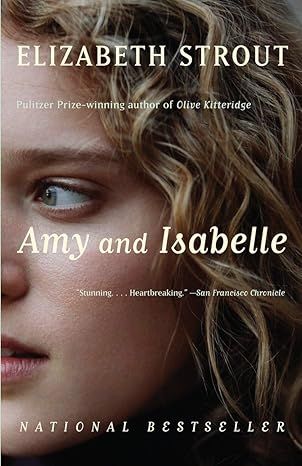
Amy and Isabelle: A novel
4.3
-
9,403
$3.34
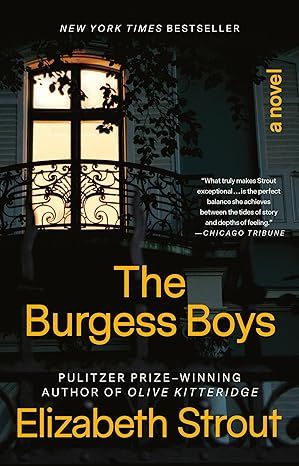
The Burgess Boys: A Novel
4.1
-
11,063
$2.11

Oh William!: A Novel
4.2
-
22,498
$5.04
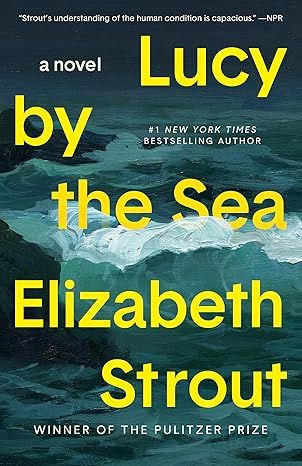
Lucy by the Sea: A Novel
4.3
-
18,461
$4.00
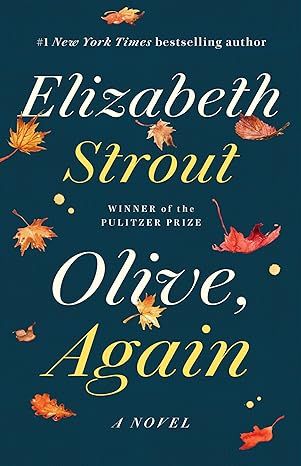
Olive, Again: A Novel (Olive, 2)
4.4
-
24,861
$9.76
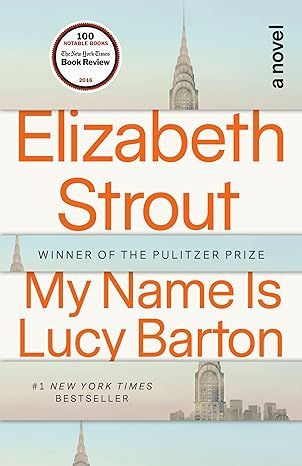
My Name Is Lucy Barton: A Novel
3.8
-
36,168
$7.94
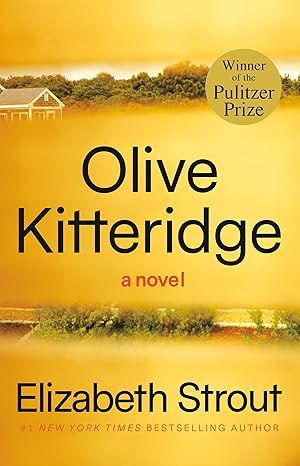
Olive Kitteridge
4.2
-
30,647
$9.49
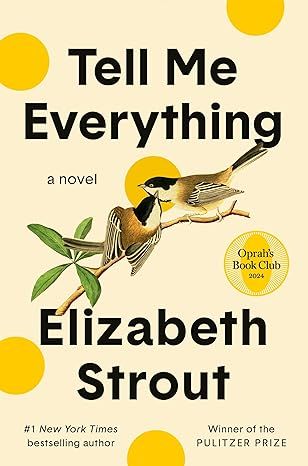
Tell Me Everything: Oprah's Book Club: A Novel
4.5
-
2,665
$14.99
Best Sellers

The Tuscan Child
4.2
-
100,022
$8.39

The Thursday Murder Club: A Novel (A Thursday Murder Club Mystery)
4.3
-
155,575
$6.33

Sapiens: A Brief History of Humankind
4.6
-
140,302
$13.49

The Butterfly Garden (The Collector, 1)
4.3
-
88,556
$9.59

Things We Hide from the Light (Knockemout Series, 2)
4.4
-
94,890
$11.66

The Last Thing He Told Me: A Novel
4.3
-
154,085
$2.99

The Perfect Marriage: A Completely Gripping Psychological Suspense
4.3
-
143,196
$9.47

The Coworker
4.1
-
80,003
$13.48

First Lie Wins: A Novel (Random House Large Print)
4.3
-
54,062
$14.99

Mile High (Windy City Series Book 1)
4.4
-
59,745
$16.19

Layla
4.2
-
107,613
$8.99

The Locked Door
4.4
-
94,673
$8.53
